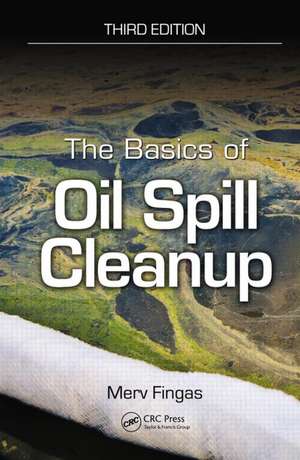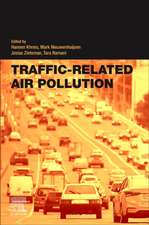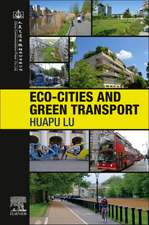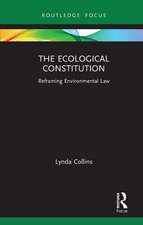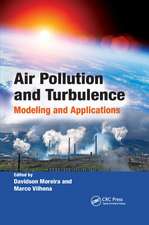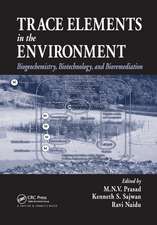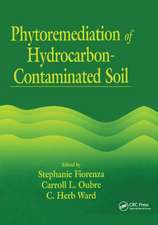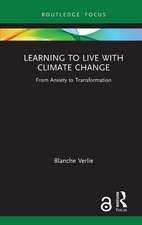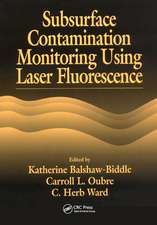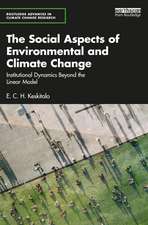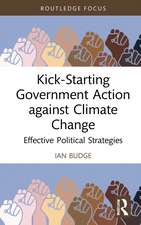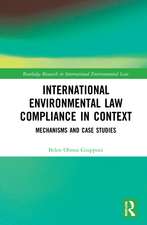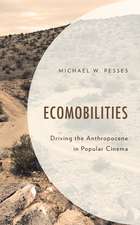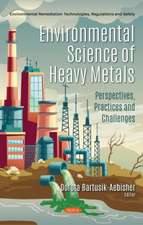The Basics of Oil Spill Cleanup
Autor Merv Fingasen Limba Engleză Hardback – 5 dec 2012
The chapters describe surface and remote sensing technologies used to detect and track oil slicks, and methods to contain oil on water (booms and ancillary equipment) and recover oil from the water surface (skimmers, sorbents, and manual recovery). The author discusses the use of pumps, in-situ burning, and chemical agents, such as dispersants, for oil removal. He also addresses oil-contaminated shorelines and the effects and behavior of oil on different ecosystems and the various organisms within them. Written for the general public as well as those directly involved with oil spill cleanup, this edition provides broad, up-to-date knowledge of the cleanup and control of spills.
Preț: 1117.07 lei
Preț vechi: 1362.29 lei
-18% Nou
Puncte Express: 1676
Preț estimativ în valută:
213.78€ • 232.13$ • 179.57£
213.78€ • 232.13$ • 179.57£
Carte tipărită la comandă
Livrare economică 22 aprilie-06 mai
Preluare comenzi: 021 569.72.76
Specificații
ISBN-13: 9781439862469
ISBN-10: 143986246X
Pagini: 286
Ilustrații: 184 b/w images and 22 tables
Dimensiuni: 156 x 234 x 20 mm
Greutate: 0.68 kg
Ediția:Revizuită
Editura: CRC Press
Colecția CRC Press
ISBN-10: 143986246X
Pagini: 286
Ilustrații: 184 b/w images and 22 tables
Dimensiuni: 156 x 234 x 20 mm
Greutate: 0.68 kg
Ediția:Revizuită
Editura: CRC Press
Colecția CRC Press
Public țintă
Academic, Professional, and Professional Practice & DevelopmentCuprins
Oil Spills: Why Do They Happen and How Often? Response to Oil Spills. Types of Oil and Their Properties. Behavior of Oil in the Environment. Analysis, Detection, and Remote Sensing of Oil Spills. Containment on Water. Oil Recovery on Water. Separation, Pumping, Decontamination, and Disposal. Spill-Treating Agents. In-Situ Burning. . Shoreline Cleanup and Restoration. . Oil Spills on Land. Effects of Oil Spills on the Environment. Glossary. Reading for Further Information. Index.
Notă biografică
Merv Fingas, M.Sc., MBA, Ph.D., has worked for more than 38 years in the field of oil spill technology. He was chief of Environment Canada’s Environmental Emergencies Technology Centre in Ottawa for over 30 years. He has conducted research in spill dynamics and behavior, and studies of spill treating agents, in-situ burning of oil, and oil spill chemistry and analysis. Dr. Fingas has authored or coauthored more than 800 technical reports and papers on various aspects of oil or chemical research. These include topics such as oil emulsion formation, oil evaporation, treating agent testing and use, studies of oil analysis and fingerprinting, in-situ burning of oil, oil spill remote sensing, and personal protection equipment. This is his seventh book.
Recenzii
"The Basics of Oil Spill Cleanup is a classical reference in the field. This third edition has been revised and expanded reflecting the rapid progress in clean-up technology and the techniques available for mitigating the effects of oil spills."
—International Journal of Environmental Analytical Chemistry, December 2014
"This book is a welcomed update of the second edition ... The book provides an excellent introduction for newcomers to the field of oil spills. The book is well-written for the broad audience for which it is intended and would be very useful as a required or recommended textbook for introductory oil spill courses."
—Dr. Carl E. Brown, Environment Canada
"A well written book in which the subject matter is addressed in a comprehensive way and well organized for easy reference. ... The text is complemented by excellent photographs, diagrams and tables. Most importantly, the new edition is fully up-to-date, reflecting the latest developments in our knowledge of oil spill clean-up and the techniques available for mitigating the effects of oil spills."
—John McMurtrie, Secretary, International Spill Control Organization
Praise for Previous Editions
"… presents a practical perspective and overview in dealing with on-and off-shore oil spills that can potentially affect sensitive coastal environments and habitats … Certainly when oil spills occur, notably in a highly visible, sensitive and/or media concentrated area, such a book provides a good synopses as to the methods employed when dealing with such circumstances."
—Stephen M. Testa, Testa Environmental Corporation
"This book is a welcomed update of the second edition ... The book provides an excellent introduction for newcomers to the field of oil spills. The book is well-written for the broad audience for which it is intended and would be very useful as a required or recommended textbook for introductory oil spill courses."
—Dr. Carl E. Brown, Environment Canada
"A well written book in which the subject matter is addressed in a comprehensive way and well organized for easy reference. ... The text is complemented by excellent photographs, diagrams and tables. Most importantly, the new edition is fully up-to-date, reflecting the latest developments in our knowledge of oil spill clean-up and the techniques available for mitigating the effects of oil spills."
—John McMurtrie, Secretary, International Spill Control Organization
Praise for Previous Editions
"… presents a practical perspective and overview in dealing with on-and off-shore oil spills that can potentially affect sensitive coastal environments and habitats … Certainly when oil spills occur, notably in a highly visible, sensitive and/or media concentrated area, such a book provides a good synopses as to the methods employed when dealing with such circumstances."
—Stephen M. Testa, Testa Environmental Corporation
—International Journal of Environmental Analytical Chemistry, December 2014
"This book is a welcomed update of the second edition ... The book provides an excellent introduction for newcomers to the field of oil spills. The book is well-written for the broad audience for which it is intended and would be very useful as a required or recommended textbook for introductory oil spill courses."
—Dr. Carl E. Brown, Environment Canada
"A well written book in which the subject matter is addressed in a comprehensive way and well organized for easy reference. ... The text is complemented by excellent photographs, diagrams and tables. Most importantly, the new edition is fully up-to-date, reflecting the latest developments in our knowledge of oil spill clean-up and the techniques available for mitigating the effects of oil spills."
—John McMurtrie, Secretary, International Spill Control Organization
Praise for Previous Editions
"… presents a practical perspective and overview in dealing with on-and off-shore oil spills that can potentially affect sensitive coastal environments and habitats … Certainly when oil spills occur, notably in a highly visible, sensitive and/or media concentrated area, such a book provides a good synopses as to the methods employed when dealing with such circumstances."
—Stephen M. Testa, Testa Environmental Corporation
"This book is a welcomed update of the second edition ... The book provides an excellent introduction for newcomers to the field of oil spills. The book is well-written for the broad audience for which it is intended and would be very useful as a required or recommended textbook for introductory oil spill courses."
—Dr. Carl E. Brown, Environment Canada
"A well written book in which the subject matter is addressed in a comprehensive way and well organized for easy reference. ... The text is complemented by excellent photographs, diagrams and tables. Most importantly, the new edition is fully up-to-date, reflecting the latest developments in our knowledge of oil spill clean-up and the techniques available for mitigating the effects of oil spills."
—John McMurtrie, Secretary, International Spill Control Organization
Praise for Previous Editions
"… presents a practical perspective and overview in dealing with on-and off-shore oil spills that can potentially affect sensitive coastal environments and habitats … Certainly when oil spills occur, notably in a highly visible, sensitive and/or media concentrated area, such a book provides a good synopses as to the methods employed when dealing with such circumstances."
—Stephen M. Testa, Testa Environmental Corporation
Descriere
An examination of pollution caused by crude oils and petroleum products derived from them, this book covers how oil spills are measured and detected, the properties of the oil, and oil’s long-term fate in the environment. Reflecting the rapid progress in cleanup technology since the previous edition, it covers the latest techniques as well as recent spills, including the Gulf of Mexico. Written for the general public as well as those directly involved with spill cleanup, this edition provides broad, up-to-date knowledge of the cleanup and control of oil spills.
